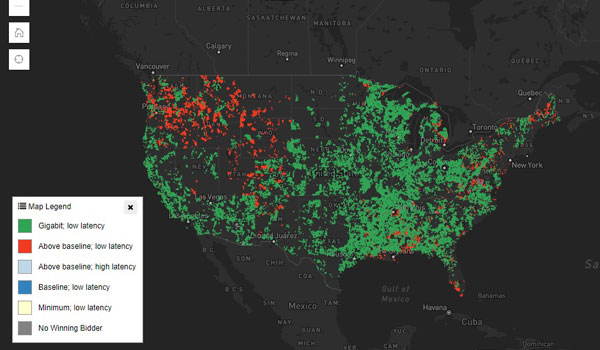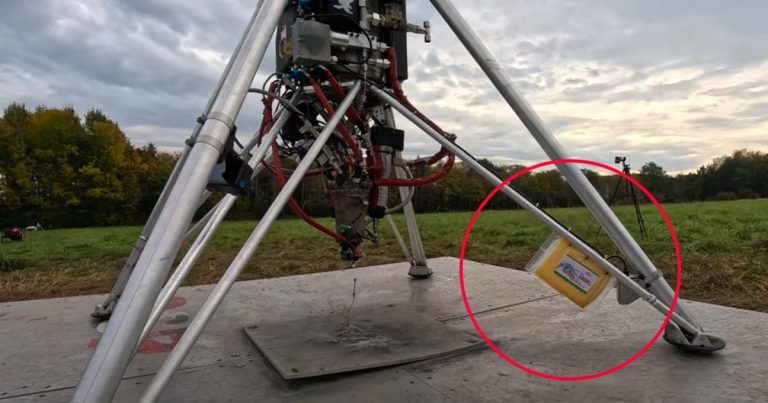
Republican FCC Commissioner Criticizes Reversal of $885.5 Million Rural Broadband Subsidies to SpaceX (Image Credit: Payload)

by Douglas Messier
Managing Editor
The Federal Communications Commission (FCC) senior Republican member has criticized the commission’s decision to rescind $885.5 million in subsidies awarded to SpaceX to bring Starlink broadband service to underserved rural areas as part of a controversial 2020 auction criticized for including many already served urban areas.
“The FCC’s 2020 award to Starlink secured a commitment for the delivery of high-speed Internet service to 642,925 unserved rural homes and businesses across 35 states,” Brendan Carr said in a statement. “By reversing course, the FCC has just chosen to vaporize that commitment and replace it with . . . nothing. That’s a decision to leave families waiting on the wrong side of the digital divide when we have the technology to get them high-speed service today.”
Earlier this month, the FCC announced it was rejecting SpaceX’s award and $1.2 billion in subsidies to LTD Broadband as part of $9.2 billion awarded to more than 300 bidders under the Rural Digital Opportunity Fund (RDOF) program. The amounts represented the total awards won by the two companies in the auction.
Although the FCC announced the results of the auction in December 2020, the commission has been awarding subsidies in tranches only after conducting what it calls “an exhaustive technical, financial, and legal review” of each winning bidder. The RDOF program has approved awards worth more than $5 billion to provide service to more than three million locations in 47 states, the FCC said earlier this month.
“After careful legal, technical, and policy review, we are rejecting these applications. Consumers deserve reliable and affordable high-speed broadband,” said FCC Chairwoman Jessica Rosenworcel in a press release. “We must put scarce universal service dollars to their best possible use as we move into a digital future that demands ever more powerful and faster networks. We cannot afford to subsidize ventures that are not delivering the promised speeds or are not likely to meet program requirements.”
“Starlink’s technology has real promise. But, the question before us was whether to publicly subsidize its still developing technology for consumer broadband—which requires that users purchase a $600 dish—with nearly $900 million in universal service funds until 2032,” she added.
FCC said LTD, a relatively small fixed wireless provider that was the auction’s largest winning bidder, failed to timely obtain eligible telecommunications carrier status in seven of the 15 states where it bid to provide service.
“Ultimately, the FCC review concluded that LTD was not reasonably capable of deploying a network of the scope, scale, and size required by LTD’s extensive winning bids,” FCC said in a press release.
Carr, who made no mention of the LTD decision, said complaints about Starlink’s upload and download speeds are unfounded.
“Second, the agency decision casts aspersion on the Starlink system in turning heel on the Commission’s 2020 award—calling the technology ‘risky’ and ‘still developing.’ But those arguments do not bear out,” he said. “To start, the one set of speed test data the FCC cites shows that Starlink’s speeds have increased significantly year over year, not decreased over that time period. And in any event, the relevant speed benchmarks that the full Commission imposed in 2020 on Starlink and all other infrastructure award winners do not kick in for another three years.”
Carr said that while the FCC has soured on Starlink, the U.S. Air Force has signed a deal with SpaceX worth nearly $2 million to deliver high-speed Internet service to military bases.
“Third, the agency cites Starlink’s price point in denying it this universal service award. Yet right now, the FCC is providing universal service awards for far slower Internet services that cost consumers far more. Indeed, when I learned about the FCC’s decision while on a work trip to Napakiak, Alaska, I heard from residents there and in surrounding villages that are paying hundreds of dollars every single month for services supported by the FCC’s universal service awards that deliver speeds less than 1/10th of Starlink’s,” Carr added.
A Controversial Auction
The RDOF auction, conducted under Republican FCC Chairman Ajit Pai six weeks before the Trump Administration ended, was heavily criticized at the time as being based on flawed census blocks that did not properly delineate between rural areas in need of high-speed broadband services and developed urban areas that could be served by existing providers without public subsidies.
Free Press six-part deep dive at the time looking at the more egregious awards given to more than 300 providers. One story, “Broadband Boondoggle: Ajit Pai’s $886M Gift to Elon Musk,” chronicles how SpaceX won subsidies to provide service to terminals and adjacent areas at Miami International Airport, Minneapolis-Saint Paul International Airport, Philadelphia International Airport and many other urban areas. (Free Press just added a seventh story, “Why Elon Musk Is No Longer Getting $886M from the FCC,” in the wake of the commission’s denial of subsidies to SpaceX and LTD Broadband.)
Free Press made clear that SpaceX played by the rules, and that it was not the only bidder to receive awards to serve urban areas that critics said should not have qualified for rural broadband subsidies. After Pai left at the end of the Trump Administration, the FCC under Democratic Chairwoman Rosenworcel sent letters to 197 bidders asking them to withdraw bids for urban census blocks so funding could be redirected to rural areas.
In a January press release, the FCC said that bidders had chosen not to pursue subsidies in approximately 5,000 census blocks in response to the letters. It is not known whether SpaceX and LTD Broadband withdrew bids on any blocks. However, the award amounts the FCC rejected earlier this month for the companies were the same as those announced in December 2020.
The FCC also announced a series of changes to improve accountability in RDOF program, including increased audits and verification of recipients and enhanced program transparency. The commission said it had saved $350 million that can be redirected to other providers by denying waivers to winning bidders that had failed to receive state approvals for their services or take other actions to further their applications.








